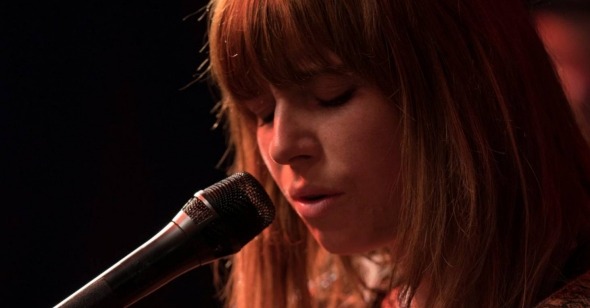She’s Leaving Home
by Lindsay Brayton
Wild Rose
Dir. Tom Harper, UK, Neon
Fueled by the charisma of the spirited Jessie Buckley, Wild Rose follows Rose-Lynn Harlan, a Scottish sparkplug with big dreams of becoming a Nashville country music star. Rose-Lynn has hurricane-level energy—equal parts captivating and grating—and a destructive selfish streak, but Wild Rose insists on maintaining a wide-eyed and likable tone even as its protagonist offers glimpses of the deep-seated self-absorption that accompanies a person determined to live a life devoted to artistic expression.
The film begins as Rose-Lynn is being released from jail after a year of confinement. Once free, her first stop is a quick shag with a clueless suitor before she shows up at the doorstep of her long-suffering mother, Marion (Julie Walters), who has been the main caregiver for Rose-Lynn’s two young children. The children eye their mother warily—and with reason: she barely sits down to share a meal with them before she’s off to her next location, Glasgow’s Grand Ole Opry. Before her incarceration, the country-themed dive bar, featuring a square-dance hall, was Rose-Lynn’s primary performance venue. With its murals of the American west and cowboy-hatted line dancers, it’s a strange bit of Americana kitsch in Scotland and its existence undermines one of the film’s main conflicts: that Rose-Lynn is tagged as the only person in the UK who appreciates country music.
Determined to make it to Nashville, but in need of money, Rose-Lynn takes a job as a house cleaner for a wealthy woman with a heart of gold named Susannah (Sophie Okonedo). Susannah becomes a kind of fairy godmother for Rose-Lynn. She is warm and trusting, and when she discovers Rose-Lynn’s dream, she supports her aspirations and utilizes her elite resources to help make it a reality. Rose-Lynn’s bond to Susannah is contrasted to her relationship with Marion, who wants her daughter to forget about country music and focus on being a present and reliable mother. With Susannah, Rose-Lynn can pretend to be someone unburdened by domestic responsibilities. She doesn’t tell Susannah she has two little kids, or that she was recently in jail.
As Rose-Lynn bounces between the supportive, responsibility-free world she shares with Susannah and the disappointments and domestic duties that greet her at home, Wild Rose pushes forward with a rapid pace to stay in stride with Buckley’s forceful energy. This briskness, however, often feels like an attempt to barrel past plot contrivances. Though the film’s three lead actresses give committed, diligent performances, the characters often behave in ways that push the story in new dramatic directions at the expense of consistency. For instance, though Rose-Lynn is in every scene, she has no tenable history that predates the film. The reason for her incarceration is brushed over so quickly it’s easy to miss; there is no mention of the father(s) of her children, she has no friends, no personality, really, outside of the convictions driving her to stardom.
Wild Rose is full of earnest, meaningless declarations such as Rose-Lynn’s claim “I should be American,” and song lyrics like “You’ve got to be weak if you want to be strong,” and “Live the life you dreamed of until the dreamer is gone.” The film never investigates why Rose-Lynn likes country music or why she feels a connection to America, and refrains from acknowledging the seemingly essential fact that country music has Celtic roots. The film barrels forward, feeding off Buckley’s energy without attempting to add nuanced details that would have provided a more fully realized world.
Wild Rose slows down only for Rose-Lynn’s musical performances. There are a few rowdy onstage gigs at Glasgow’s Grand Ole Opry, where Buckley’s musical talents are best showcased, but for the most part when she performs the film slides into a dreamy trance with gentle floating camerawork and golden light that circles Rose-Lynn’s head like a halo. Everything about these moments telegraphs for the audience that her performance is transcendent as much for Rose-Lynn as for the people watching. When she sings, she is free, but the disquieting truth that the film only hints at is that this means she is also free from the burden of adult responsibilities and the altruistic demands of motherhood.
Country music represents a way out of Glasgow for Rose-Lynn, but it’s just as much an escape from the family she’s found herself saddled with. Right after she’s released from jail, Rose-Lynn tells her mother she’s going to Nashville, because “there’s nothing for me here.” Yet she has two children in the next room. The film shows little interest in exploring the darker side of Rose-Lynn’s determination, instead concocting a risk-free happily-ever-after ending that contradicts everything she had been building towards.
